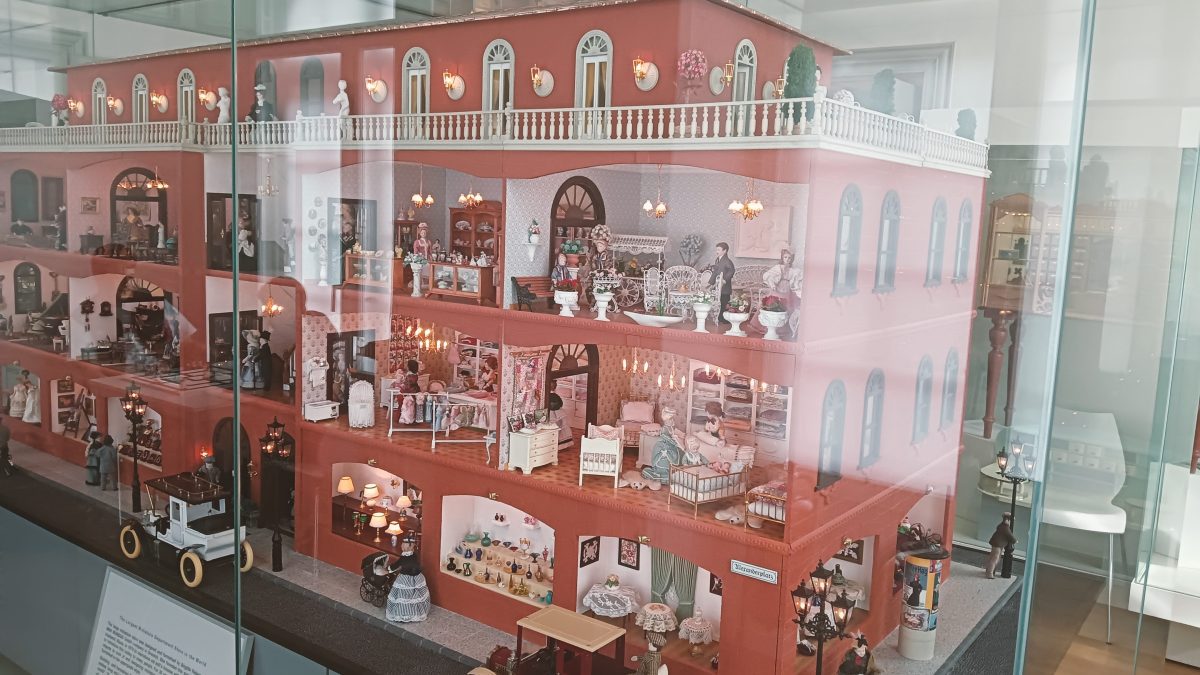La mobilità a Freigericht in Germania per il progetto Erasmus+ Fostering Global Citizenship
di Letizia Marzo (4H)
2022-1-IT02-KA122-SCH-000075868

Incuriosita, emozionata ed entusiasta di quel che quest’esperienza poteva insegnarmi, sono partita con altri coetanei del mio Liceo, il De Giorgi di Lecce, per vivere quest’avventura. Arrivata in stazione a Gelnhausen, sono stata accolta dalla mia famiglia ospitante che, sin da subito, si è interessata alle nostre tradizioni, alle nostre abitudini, mi ha descritto ciò che avremmo fatto nei giorni successivi, per instaurare un rapporto con me e farmi sentire a mio agio.
Il giorno seguente, una volta familiarizzato con l’ambiente scolastico, abbiamo approcciato le attività del progetto di cittadinanza globale che hanno caratterizzato l’esperienza. Ci siamo confrontati su temi quali l’uguaglianza di genere (cardine del progetto), la democrazia, l’immigrazione e l’integrazione.
In gruppo abbiamo analizzato le realtà di ogni Paese rendendo così più evidenti i diversi scenari che determinano disuguaglianze di genere, in particolare nel mondo del lavoro. Perché l’uomo è ben visto a fare il soldato mentre la donna no?
Se per noi italiani e spagnoli è da considerarsi un traguardo acquisito ritenuto normale, per i cittadini svedesi rimane una prerogativa prettamente maschile.
Altro aspetto che ci ha coinvolte – spesso sottovalutato – è quello relativo all’infanzia in cui si distinguono, attraverso i giochi, i diversi ruoli all’interno della società tra “solo rosa“ e “solo blu”. Basti pensare che, grazie agli stereotipi, che associano i generi ai colori, si stabilisce ad utilizzo femminile un gioco di colore rosa, e al maschile di colore blu; ciò comprovato anche da diversi studi per cui i bambini considerano i giochi più adatti a se stessi quelli riferiti al colore e non all’esperienza o alle emozioni che ne potrebbero derivare.
Col passare degli anni molti giochi si sono affinati sia ai gusti femminili che a quelli maschili e ciò è stato più evidente il giorno in cui abbiamo visitato il museo dei giocattoli di Hanau che ci ha fornito diversi spunti di discussione ed interrogativi.
Perché è sempre stato così scontato che le bambine giocassero solo con le bambole mentre i bambini solo con i soldatini o le macchine o le armi? È davvero cambiato qualcosa con i nuovi giochi “unisex” o i bambini continueranno a giocare solo con le cose da “maschio” e viceversa per le bambine? Nessuno è riuscito a dare una risposta ben definita, però, in generale, siamo d’accordo ad affermare che tutto dipende e dipenderà dalla società, dagli stereotipi ad essa associati ed in continuo mutamento.
Nei giorni successivi, la visita alla chiesa Dutch-Walloon, Paulskirche e della Cattedrale Kaiserdom ci ha offerto diversi spunti di riflessione anche su altre tematiche: la democrazia, l’immigrazione e l’integrazione.
L’esperienza nel suo insieme mi ha motivata ad essere più consapevole anche dei vari processi decisionali che incidono sulla nostra quotidianità. Proprio per questo, tramite un acceso dibattito, abbiamo proposto modifiche della legge europea, in particolare su alcuni temi che riteniamo importanti, ma che non sono trattati in maniera omogenea nei diversi Stati, ad esempio:
- favorire la partecipazione giovanile alla politica, adeguando l’età di candidatura a 18 anni in tutti gli Stati;
- ottenere pari agevolazioni da usufruire nel periodo di maternità per entrambi i genitori, uniformando la normativa svedese con quella tedesca e italiana;
- nel mondo del lavoro, perseguire la parità tra uomo e donna;
- migliorare la gestione dei flussi migratori e farsi carico – tutti gli Stati membri insieme – di istituire dei centri di accoglienza adeguati ai bisogni e rispettosi della qualità della vita degli immigrati;
- migliorare l’assistenza che il singolo Stato deve garantire ai migranti, per un periodo di due anni, nel percorso d’integrazione nella società, di formazione, ricerca di lavoro e di un’abitazione.
Nonostante la notevole concordanza d’intenti sono forti le contrapposizioni tra gli Stati riguardo il tema dell’immigrazione e le modalità di gestione del fenomeno migratorio.
Alcuni Stati propendono verso il rigoroso controllo delle frontiere (Italia, Spagna), altri favoriscono gli ingressi regolari aprendo le frontiere (Svezia) altri infine – condizionati dalla preoccupazione che genera l’arrivo incontrollato di persone – puntano alla chiusura dei valichi (Germania).
Concludendo direi che vivere e confrontarmi con persone e culture diverse ha ampliato il mio orizzonte e fatto comprendere quanto effettivamente ci siano vicini aspetti e problematiche che invece consideravo fossero oggetto di discussione tra soli adulti.
Non esiste un’età minima per partecipare alle scelte, anzi si dovrebbe favorire la partecipazione ed il contributo di tutti/e, per determinare scelte comuni nell’interesse dei popoli e di ciascuno/a.

The days of the project
Arrival day 17/09/23
On this day we just travelled. Everything went well. We met the family at the train station in Wächtersbach. I was so scared because they were strangers and also we didn’t speak the same language. When we arrived home, we had dinner with some traditional German dishes. It was good but tasted strange. When we were at the table we talked about the school system, the city, our interests and many things like this. It helped me break the ice with Levin and his mom and then, when I went to bed, I started to realize how beautiful this experience would have been.
First day 18/09/23
The day started at 6.40 a.m. when Levin’s mother woke me up because I didn’t hear the alarm. We went out at 7.30 for the bus and then met everyone at the KSF (the school). When we arrived in the class, we started all the activities. They were interesting and it helped me to start taking confidence with the language. About mid-morning we took a break that we used to visit the school (it’s huge compared to ours). At 12.00 a.m we got lunch at the school’s canteen. It wasn’t so good, but it wasn’t even that bad. When all the activities were finished we went home and I met his elder brother for the first time. He is really nice and I enjoyed talking with him. Then at 4.00 p.m., we arrived at Langenselbold, Kjell and Devin’s town. We went out with them and some other friends until 9.30 pm. When we arrived at home, I took a shower and the day ended.
Second day 19/09/23
Today started at the train station at 8.30 a.m. We arrived in Hanau and visited the toy museum. It felt like time travel for the difference between the years. After that, we got the lunch break and most of us went to an Italian restaurant. The family who carried the restaurant was Italian so we talked in our language. It was funny to see all the German clients try to talk and listen to some Italian. Then we did a “treasure hunt” to find more information about the city, in particular the church. It was interesting but a little bit difficult for the signs in a German dialect. At 4.00 p.m the free time started. Me and my Italian friends went to the mall and bought some sweets. At 5.30 p.m we went to Kjell’s house and spent all the time there until dinner. When we finished eating we decided to go out and stay there until 10 p.m. I thought that the day had ended but when we arrived at home, after a short conversation, Levin decided to show me what he could do with the piano and the guitar. I think that it was the best part of the day.
Third day 20/09/23
The first thing that we did when we arrived in Frankfurt was to visit a church called Paulskirche (St. Paul’s church) and try to learn something about its story with some tasks. After that we visited something else like the Kaiserdom (“Imperial” Cathedral) and Frankfurter Römer (town hall), then the free time started and I, my Italian friends and some German friends did some shopping. When lunchtime arrived we ate at “ Five Guys”. At 5.30 p.m. we arrived at Levin’s school and his father took us to an Italian restaurant, where we met his brother and his mom. In the evening we went to Mia’s house and spent the rest of the day there.
Fourth day – 21/09/23
In the morning we started a debate about four different topics (gender equality, immigration, inclusion and democracy). On this day we ate at the school’s canteen and, when we finished with the school, we had all of the rest of the day free so Levin decided to bring me to his horse. I rode it and went through a forest with Levin (he was walking) as a guide. I loved this experience, really really loved it. Then we went home, had a shower and, after an hour, we went out to Hanau, where we met Devin and Kjell (with their hosts) and ate at a sushi restaurant.
Fifth day – 22/09/23
The last day of school has arrived. When we arrived at school we continued the debate about immigration and integration. It was harder than yesterday because immigration is a really sensitive topic. When we finished, they handed over the certifications of this experience and literally said “goodbye” to everyone. At about 12.00, in the school’s canteen, we ate a plate of pasta with something like tomato sauce with some meat. I didn’t eat much because I was starting to realize that this experience was ending and I was really sad. All the afternoon was free. With Levin’s mother, we decided to do some shopping to buy something for the trip and then, when we got home, I slept until 17.00. When I woke up, I had dinner and, after about half an hour, all the family decided to take me to their cousin’s city and, after that, to Alzenau to visit the castle. In the evening, when 8 pm arrived, we went to Marius’ house with all the Italian guys and their hosts.
Departure day – 23/09/23
Unfortunately, the last day arrived. In the morning everything went like the other days and at 8.30 we went to the train station. We met with the others there, the place where, crying, we all said goodbye. The trip was really long and stressful and ended at 1:00am. in the Brindisi airport.


